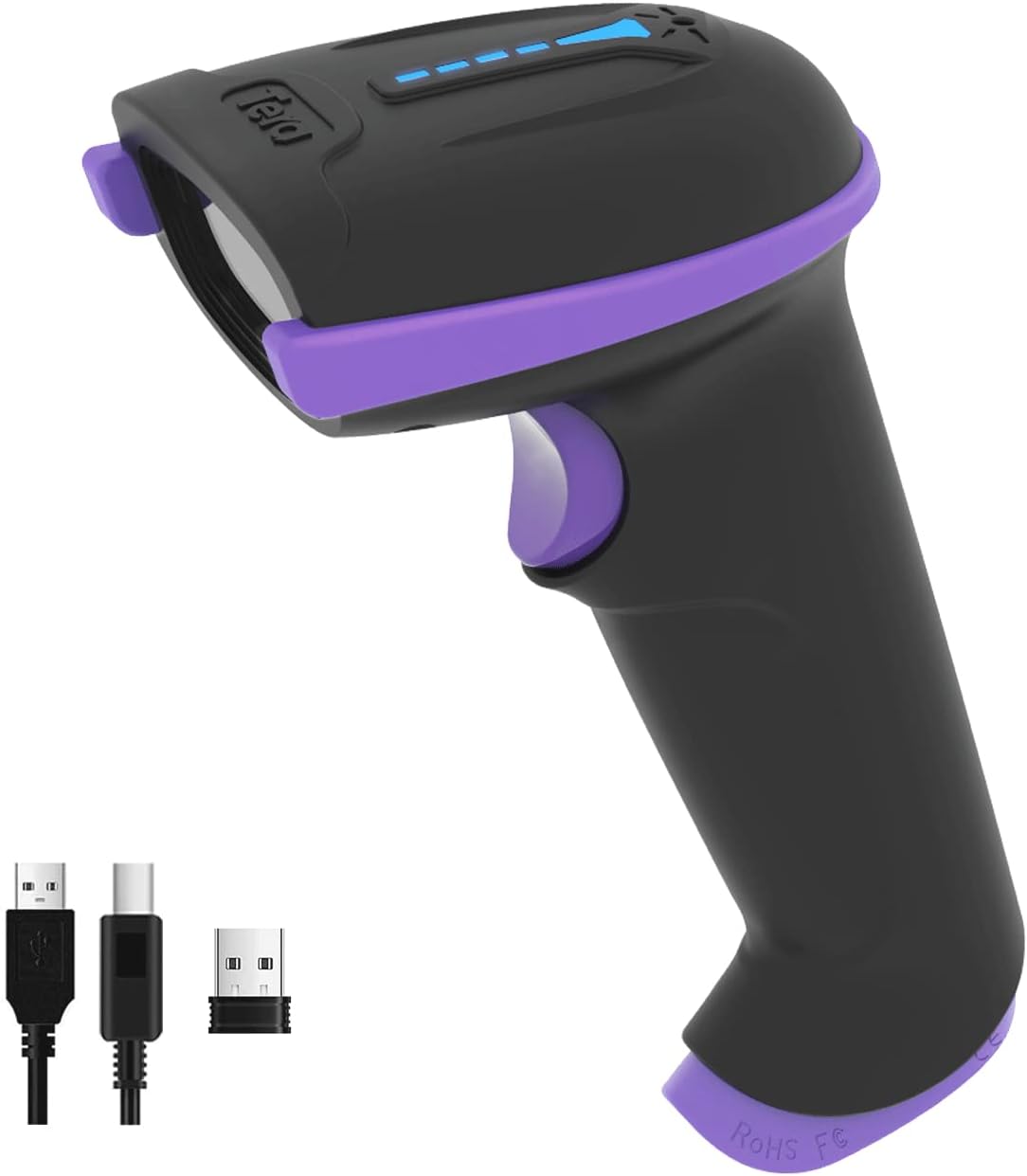Discover the benefits of sweatbands for your fitness routine. Enhance your performance and stay comfortable with these stylish and functional accessories.


In today’s fast-paced business world, efficient inventory management is crucial for the success of any business. One key component of efficient inventory management is using a wireless barcode scanner. In this guide, we will explore the benefits of using a wireless barcode scanner, how it works, and how it can improve your inventory management process.
One of the main benefits of using a wireless barcode scanner is improved accuracy in inventory management. Manual data entry is prone to human errors, such as typos and misinterpretations. With a wireless barcode scanner, you can scan barcodes to quickly and accurately record product information, reducing the chances of errors.
Using a wireless barcode scanner saves time compared to manual data entry. Scanning a barcode takes only a fraction of the time it would take to manually enter the same information. This time-saving feature enables your employees to focus on other important tasks, leading to increased productivity.
With a wireless barcode scanner, you can update your inventory records in real-time. When an item is scanned, the barcode scanner instantly updates your inventory management system, providing accurate and up-to-date information. This helps you make informed decisions regarding inventory replenishment and stock levels.
Unlike wired barcode scanners, wireless barcode scanners offer enhanced mobility. Employees can move freely around the warehouse or store, scanning barcodes without being limited by cables. This flexibility improves efficiency and reduces the risk of accidents caused by tangled cables.
Wireless barcode scanners are designed to seamlessly integrate with your existing inventory management system. They can connect wirelessly to your computer or mobile device, allowing for easy data transfer. This eliminates the need for manual syncing and reduces the risk of data loss or duplication.

A wireless barcode scanner consists of two main components: the scanner and the base station. The scanner is a handheld device that captures the barcode information, while the base station acts as a receiver and transmits the data to a computer or mobile device.
When a barcode is scanned, the scanner emits a beam of light that reflects off the barcode. The reflected light is then converted into an electrical signal, which is decoded by the scanner. The decoded information is sent to the base station via wireless communication, and the base station transfers the data to the connected device.
Wireless barcode scanners use different wireless technologies, such as Bluetooth or Wi-Fi, to establish a connection with the base station. Bluetooth barcode scanners offer a range of up to 100 meters, while Wi-Fi barcode scanners can have a range of several hundred meters.
When choosing a wireless barcode scanner for your business, there are several factors to consider:
Ensure that the wireless barcode scanner you choose is compatible with the types of barcodes used in your industry. Common barcode types include UPC, EAN, Code 39, and Code 128. Some scanners may also support 2D barcodes like QR codes.
Determine the range and connectivity options that best suit your business needs. If you have a large warehouse or store, opt for a scanner with a longer wireless range. Consider whether Bluetooth or Wi-Fi connectivity is more suitable for your environment.
Consider the durability of the wireless barcode scanner, especially if it will be used in a rugged environment. Look for scanners that are drop-resistant and have an IP rating for dust and water resistance.
Check the battery life of the wireless barcode scanner. A long battery life is important to ensure uninterrupted scanning and minimize downtime for recharging.
Choose a wireless barcode scanner that is easy to use and comfortable to hold for extended periods. Look for features such as ergonomic design, trigger buttons, and clear display screens.

Before implementing a wireless barcode scanner system, assess your current inventory management process. Identify areas where manual data entry is prone to errors or time-consuming. Determine how a wireless barcode scanner can streamline these processes and improve efficiency.
Select an inventory management software that is compatible with wireless barcode scanners. The software should support real-time data updates, have user-friendly interfaces, and offer comprehensive reporting and analysis features.
Provide training to your employees on how to use the wireless barcode scanner effectively. Teach them how to properly scan barcodes, troubleshoot common issues, and integrate the scanner with the inventory management software.
Before fully implementing the wireless barcode scanner system, conduct thorough testing to ensure that it works seamlessly with your inventory management software. Test different scenarios, such as scanning multiple barcodes simultaneously or scanning damaged or worn-out barcodes.
Regularly monitor and evaluate the performance of your wireless barcode scanner system. Collect feedback from your employees and make necessary adjustments to improve the efficiency and accuracy of your inventory management process.
Using a wireless barcode scanner can also lead to improved customer service. With accurate and up-to-date inventory information, you can quickly check stock levels and provide accurate information to customers. This reduces the chances of overselling or disappointing customers with out-of-stock items. Additionally, wireless barcode scanners allow for faster and more efficient checkout processes, resulting in shorter wait times for customers.
Implementing a wireless barcode scanner system can lead to cost savings in several ways. Firstly, the improved accuracy and efficiency in inventory management can help prevent overstocking or understocking of items, reducing the risk of financial losses.
Secondly, the time saved through faster scanning and data entry can result in increased productivity and reduced labor costs. Lastly, by having real-time data updates, you can make more informed decisions regarding inventory replenishment, minimizing the risk of excess inventory or stockouts.

Wireless barcode scanners can also enhance security in your inventory management process. By scanning barcodes, you can track the movement of items within your warehouse or store, reducing the risk of theft or misplacement.
Additionally, the real-time data updates provided by wireless barcode scanners can help identify any discrepancies or irregularities in inventory records, allowing for timely investigation and resolution.
Wireless barcode scanners can easily integrate with other systems and technologies, further enhancing your inventory management process. They can be integrated with point-of-sale (POS) systems, allowing for seamless tracking of sales and inventory levels.
Additionally, they can be integrated with enterprise resource planning (ERP) systems, providing a comprehensive view of inventory across multiple locations or departments.
Lastly, wireless barcode scanner systems are highly scalable, making them suitable for businesses of all sizes. Whether you have a small retail store or a large warehouse, you can easily add more scanners or expand the range of your wireless network to accommodate your growing needs. This scalability ensures that your inventory management process can keep up with the demands of your business.
– Improved accuracy in inventory management
– Time efficiency and increased productivity
– Real-time data updates for informed decision-making
– Enhanced mobility with freedom to move around
– Easy integration with existing systems
– Initial investment in purchasing the scanner and software
– Possibility of connectivity issues in certain environments
– Dependence on battery life for continuous scanning
– Potential learning curve for employees new to barcode scanning
– “Using a wireless barcode scanner has significantly improved our inventory management process. It’s so much faster and more accurate than manual data entry.” – John D.
– “I love the mobility of the wireless scanner. I can easily move around the store and scan items without any hassle.” – Sarah T.
– “The real-time data updates have been a game changer for our inventory management. We can now make informed decisions on restocking and inventory levels.” – Mark S.
Yes, most barcode scanners are compatible with a wide range of inventory management software. However, it’s always a good idea to check the specifications and compatibility before making a purchase.
The range of a barcode scanner depends on the type of connectivity it uses. Bluetooth barcode scanners typically have a range of up to 100 meters, while Wi-Fi scanners can have a range of several hundred meters.
Wireless barcode scanners are designed to scan a variety of barcodes, including damaged or worn-out ones. However, the scanning success may depend on the level of damage and the quality of the barcode reader.
The battery life of a wireless scanner varies depending on the model and usage. Some scanners can last a full workday on a single charge, while others may require more frequent recharging. It’s important to choose a scanner with a battery life that meets your needs.
Yes, there are wireless barcode scanners available that are specifically designed for rugged environments. These scanners are built to withstand drops, dust, and water, making them suitable for use in warehouses or outdoor settings.

Using a barcode scanner is a smart choice for efficient inventory management. It offers numerous benefits such as improved accuracy, time efficiency, real-time data updates, enhanced mobility, and easy integration. While there may be initial costs and potential challenges, the overall advantages make it a valuable tool for optimizing your inventory management process.
Consider the needs of your business, choose the right wireless scanner, and implement it effectively to streamline your operations and achieve greater success.
A barcode scanner is a valuable tool for efficient inventory management. It improves accuracy, saves time, provides real-time data updates, offers enhanced mobility, and seamlessly integrates with existing inventory management systems. By choosing the right wireless scanner and implementing it effectively, you can streamline your inventory management process and optimize your business operations.
Using a wireless barcode scanner is essential for efficient inventory management. It offers numerous benefits such as improved accuracy, time efficiency, real-time data updates, enhanced mobility, easy integration, improved customer service, cost savings, enhanced security, integration with other systems, and scalability. By choosing the right wireless barcode scanner and implementing it effectively, you can optimize your inventory management process and drive the success of your business.